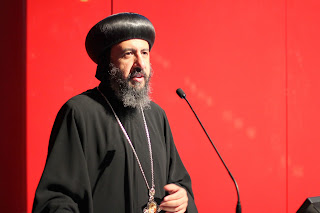Coptic Orthodox Church UK
Media and
Communications Office
Coptic Orthodox
Church (Europe)
Media and Communications Office
Remembering the late Bishop Epiphanius,
Abbot of St Makarios Monastery, Wadi-el-Natrun, Egypt
Abbot of St Makarios Monastery, Wadi-el-Natrun, Egypt
31
July 2018
Today the Coptic Orthodox Church farewells a
member of its Holy Synod, a faithful monk, a respected scholar and theologian,
and above all a beloved father figure and friend to many around the world.
The late Bishop Epiphanius was found dead
outside his cell at St Makarius monastery on 29 July 2018, and while the cause
of death is unknown, this tragic loss of life will bring sadness to the hearts
of countless members of not only the Coptic community, but to ecumenical
friends and acquaintances around the world.
Bishop Epiphanius was born on 27 June 1954 in
the Tanta Governorate in Egypt. He graduated from the Faculty of Medicine, and
joined St Makarius monastery on 17 February 1984, becoming a monk on the 21
April of that same year. He became a priest on 17 October 2002 and was ordained
a Bishop on 10 March 2013. As Abbot of the monastery, Bishop Epiphanius was
well-respected by his peers and was known for his forward thinking and
spiritual aspirations. He specialised in Church history, patristics and the
translation of Arabic texts into English in order to promote Christian
education worldwide.
Speaking of his friendship with Bishop
Epiphanius, Archbishop Angaelos, Coptic Orthodox Archbishop of London said:
“Bishop Epiphanius will be missed not only as
a respected leader and thinker, but as a dear friend and brother. His humble
spirit was an inspiration to all, and I have been personally touched by his
life and ministry. It is deeply saddening that he will no longer be with us,
and it is important at times like this that we focus some of our attention to
remembering and celebrating the wonderful witness that Bishop Epiphanius
presented, and leaves with us, through his life and ministry. Having been an
influential member of our Holy Synod, and Church at large, his ministry will
continue to live on in the hearts of those who knew, respected and loved him.
Praying repose for his soul and God’s peace and comfort to his monastic
community and all those who mourn his death, I am thankful that his life is one
that can be remembered with joy and thanksgiving.”
The funeral for Bishop Epiphanius was held in
the Monastery of St Makarios on 31 July 2018, officiated and attended by His
Holiness Pope Tawadros II, 118th Pope of Alexandria and Patriarch of the See of Saint Mark, members of the Holy Synod of the Coptic Orthodox
Church and clergy from the monastery.











